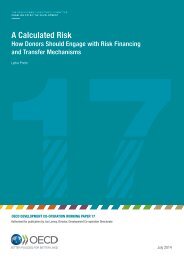UNIVERSITY
Livelihood_resilience_working_paper22
Livelihood_resilience_working_paper22
Create successful ePaper yourself
Turn your PDF publications into a flip-book with our unique Google optimized e-Paper software.
Glossary <br />
Adaptation xxvii : “The process of adjustment to actual or expected climate and its effects. In human <br />
systems, adaptation seeks to moderate or avoid harm or exploit beneficial opportunities. In some <br />
natural systems, human intervention may facilitate adjustment to expected climate and its effects” <br />
(Glossary, IPCC WG2 AR5 2014). <br />
Climate Change: “Climate change refers to a change in the state of the climate that can be identified <br />
(e.g., by using statistical tests) by changes in the mean and/or the variability of its properties, and <br />
that persists for an extended period, typically decades or longer. Climate change may be due to <br />
natural internal processes or external forcing such as modulations of the solar cycles, volcanic <br />
eruptions, and persistent anthropogenic changes in the composition of the atmosphere or in land <br />
use. Note that the Framework Convention on Climate Change (UNFCCC), in its Article 1, defines <br />
climate change as: ‘a change of climate which is attributed directly or indirectly to human activity <br />
that alters the composition of the global atmosphere and which is in addition to natural climate <br />
variability observed over comparable time periods.’ The UNFCCC thus makes a distinction between <br />
climate changes attributable to human activities altering the atmospheric composition, and climate <br />
variability attributable to natural causes” (Glossary, IPCC WG2 AR5 2014). <br />
Community-‐based adaptation: “Local, community-‐driven adaptation. Community-‐based adaptation <br />
focuses attention on empowering and promoting the adaptive capacity of communities. It is an <br />
approach that takes context, culture, knowledge, agency, and preferences of communities as <br />
strengths” (Glossary, IPCC WG2 AR5 2014). <br />
Coping xxviii : “The use of available skills, resources, and opportunities to address, manage, and <br />
overcome adverse conditions, with the aim of achieving basic functioning of people, institutions, <br />
organizations, and systems in the short to medium term” (Glossary, IPCC WG2 AR5 2014). Coping <br />
strategies are ‘erosive’ when they undermine future livelihood security (van der Geest & Dietz 2004; <br />
Warner et al. 2012). <br />
Disaster: “Severe alterations in the normal functioning of a community or a society due to hazardous <br />
physical events interacting with vulnerable social conditions, leading to widespread adverse human, <br />
material, economic, or environmental effects that require immediate emergency response to satisfy <br />
critical human needs and that may require external support for recovery” (Glossary, IPCC WG2 AR5 <br />
2014). <br />
Disaster risk management (DRM): “Processes for designing, implementing, and evaluating <br />
strategies, policies, and measures to improve the understanding of disaster risk, foster disaster risk <br />
reduction and transfer, and promote continuous improvement in disaster preparedness, response, <br />
and recovery practices, with the explicit purpose of increasing human security, well -‐ being, quality <br />
of life, and sustainable development” (Glossary, IPCC WG2 AR5 2014). <br />
Disaster risk reduction (DRR): “Denotes both a policy goal or objective, and the strategic and <br />
instrumental measures employed for anticipating future disaster risk; reducing existing exposure, <br />
hazard, or vulnerability; and improving resilience” (Glossary, IPCC WG2 AR5 2014). <br />
xxvii<br />
Reflecting progress in science, this glossary entry differs in breadth and focus from the entry used in the Fourth Assessment Report and <br />
other IPCC reports. <br />
xxviii This glossary entry builds from the definition used in UNISDR (2009) and IPCC (2012a).



